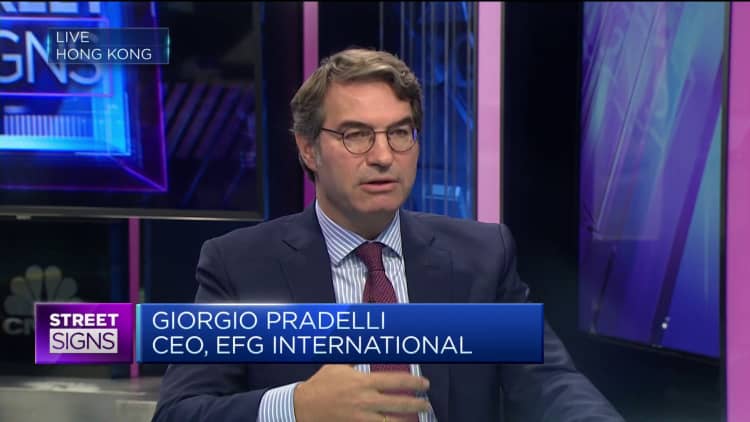Axel Lehmann, chairman of Credit Suisse Group AG, Colm Kelleher, chairman of UBS Group AG, Karin Keller-Sutter, Switzerland’s finance minister, Alain Berset, Switzerland’s president, Thomas Jordan, president of the Swiss National Bank (SNB), Marlene Amstad, chairperson of the Swiss Financial Market Supervisory Authority (FINMA), left to right, during a news conference in Bern, Switzerland, on Sunday, March 19, 2023.
Pascal Mora | Bloomberg | Getty Images
Switzerland’s financial regulator on Tuesday called for greater legal powers and vowed to adapts its approach in the wake of the Credit Suisse collapse.
The 167-year-old bank was rescued by domestic rival UBS in March in a deal brokered by Swiss authorities, after a string of risk management failures and scandals triggered a client and investor exodus that forced it to the brink of insolvency.
The Swiss Financial Market Supervisory Authority (FINMA) said in a Tuesday report that, alongside the government and the Swiss National Bank, it had achieved the aim of safeguarding Credit Suisse’s solvency and ensuring financial stability.
It also drew attention to the “far-reaching and invasive measures” taken over the preceding years to supervise the bank and to “rectify the deficiencies, particularly in the bank’s corporate governance and in its risk management and risk culture.”
From summer 2022 onwards, FINMA also told the bank to take “various measures to prepare for an emergency” — a warning it suggests went unheeded.

“FINMA draws a number of lessons in its report. On the one hand, it calls for a stronger legal basis, specifically instruments such as the Senior Managers Regime, the power to impose fines, and more stringent rules regarding corporate governance,” the regulator said.
“On the other hand, FINMA will also adapt its supervisory approach in certain areas, and will step up its review of whether stabilisation measures are ready to implement.”
FINMA said that strategic changes announced to de-risk Credit Suisse, such as downsizing its investment bank, focusing on its asset management business and reducing its earnings volatility, were “not implemented consistently,” while “recurrent scandals undermined the bank’s reputation.”
It also noted that, even in years when the bank posted heavy financial losses, the variable remuneration remained high, with shareholders making little use of opportunities to influence pay packets.
Between 2012 and the bank’s emergency rescue, the regulator says it conducted 43 preliminary investigations of Credit Suisse for potential enforcement proceedings. Nine reprimands were issued, 16 criminal charges filed, and 11 enforcement proceedings were taken against the bank and three against individuals.
FINMA said it repeatedly informed Credit Suisse of risks, recommended improvements and imposed “far reaching measures.” These included “extensive capital and liquidity measures, interventions in the bank’s governance and remuneration, and restrictions on business activities.”

“In the period from 2018 to 2022 it also conducted 108 on-site supervisory reviews at Credit Suisse and recorded 382 points requiring action,” FINMA said.
“In 113 of these points the risk was classed as high or critical. These figures and measures illustrate that FINMA exhausted its options and legal powers.”
At the time of its collapse, Credit Suisse bosses attributed the loss of confidence to the market panic triggered by the collapse of Silicon Valley Bank in the U.S.
Credit Suisse was asked over the summer to put in place crisis preparation measures, such as partial business sales and the possible sale of the entire bank in an existential emergency.
The regulator therefore called for “extended options that would enable it to have more influence on the governance of supervised institutions.”
These include the implementation of a Senior Managers Regime, powers to impose fines and option of regularly publishing enforcement proceedings.
“To enable FINMA to effectively intervene in remuneration systems, a more solid legal mandate is required,” it concluded.

